

Getting confused between web hosting and web servers is a common thing, especially for people who are new to the terms or use them interchangeably.
Before you decide which will be the best choice for your online business between web host vs web server, you have to understand that they may seem interchangeable but their working process and functions are different. let’s learn about web hosts and web servers first.
What is the definition of a Web Host?
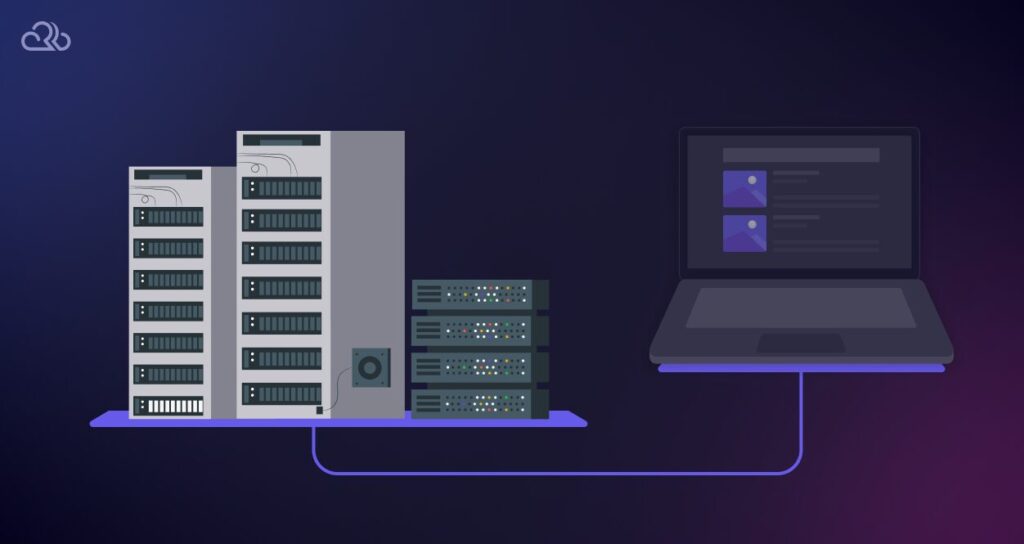
A web host is a service provider that offers the technologies and services needed for websites to get live on the internet. Websites are hosted, or stored, on special computers called servers.
When any internet users want to browse your website, all they need to do is type your website address or domain into their browser. Their computer will then connect to your server and your webpages will be delivered to them through the browser.
What are the Types of Web Hosting
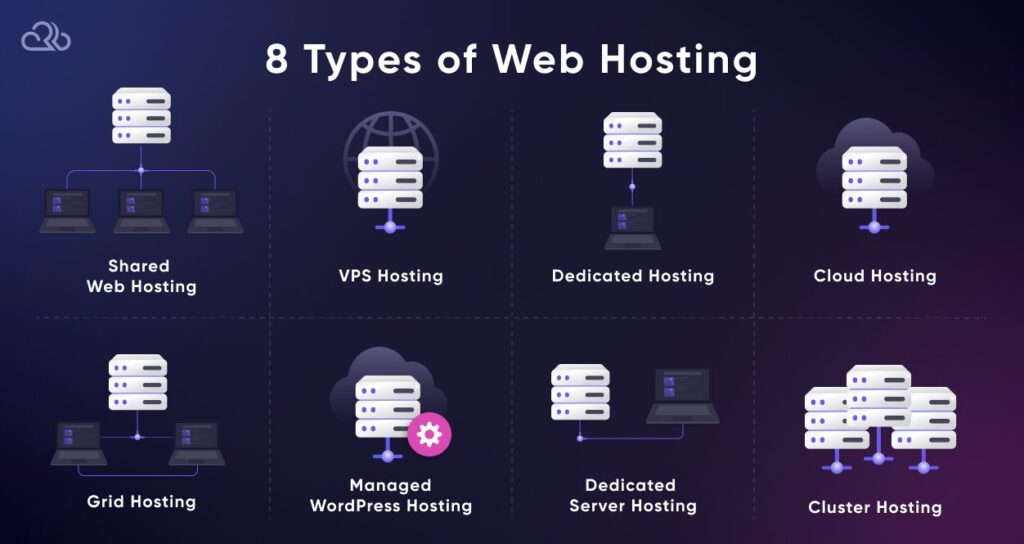
Shared Web Hosting
Shared web hosting is a service where multiple websites are redirected to a single web server that is connected to the Internet. This is the most cost-effective hosting option as costs are spread out among many users.
Advantages:
- Because resources are shared, it’s the most affordable hosting option.
- Providers often include cPanel or similar control panels for managing your website.
- The hosting provider manages the server, no technical skills are needed.
VPS Hosting
Virtual Private Server (VPS) hosting splits a server into different virtual servers, where each website is hosted on its own dedicated virtual server environment.
Advantages:
- You get a dedicated portion of server resources.
- Easily scale your resources up or down based on your needs.
- Root access allows for more customization of server settings.
Dedicated Hosting
Dedicated hosting provides a dedicated server for a single user or organization. It’s suitable for websites with high traffic volumes and costs a lot.
Advantages:
- Dedicated resources ensure high performance and stability.
- Enhanced security as you’re not sharing the server with other websites.
- Full root access allows for complete control over the server environment.
Cloud Hosting
Cloud hosting uses a network of virtual servers that tap into an underlying network of physical web servers.
Advantages:
- Resources can be scaled instantly based on demand.
- If one server fails, others in the network can take over.
- Payment is based on the resources you actually use not which are included by hosts.
Grid Hosting
Grid hosting involves distributing a website’s hosting across a network of interconnected servers, ensuring improved load balancing and reliability.
Advantages:
- Efficiently distributes traffic across multiple servers.
- Can easily add more nodes to the grid as your needs grow.
- If one node fails, others can take over, minimizing downtime.
Managed WordPress Hosting
Managed WordPress hosting is specifically optimized for WordPress websites, with the hosting company handling technical aspects like security, updates, and backups.
Advantages:
- Servers are optimized for WordPress, offering faster load times.
- Scaled up security protocols for WordPress-specific vulnerabilities.
- Automatic updates, backups, and expert WordPress support with dedicated WP Dashboard access.
There are very few dedicated WordPress hosting providers out there. Rapyd.cloud is one of them which provides finely tuned managed hosting solutions for WordPress websites.
Dedicated Server Hosting
Similar to dedicated hosting, this type of hosting offers the exclusive use of a physical server.
Advantages:
- All the server’s resources are dedicated to your website.
- Ideal for high-traffic websites requiring optimal performance.
- Full administrative access to install and run anything on the server.
Cluster Hosting
Definition: Cluster hosting uses multiple servers to host a single website, distributing the load among several machines. Example: Some enterprise-level hosting solutions offer cluster hosting to ensure website availability and scalability.
Advantages:
- Reduces the risk of downtime as there’s no single point of failure.
- Resources can be added or reduced easily across the cluster.
- Load balancing improves the website’s performance by distributing traffic.
Things to Check on a Good Web Host
Selecting the right web host is critical for the success of your website, impacting everything from user experience to security. Here are the key factors you must consider before choosing the web host:
Better Disk Space or Storage Management
Your web host should provide sufficient storage to accommodate your website’s content, including text, images, videos, and databases. As your site grows in popularity, its storage needs will increase, especially for media-rich sites.
While most small to medium websites won’t exceed 1 GB of storage, it’s essential to plan for future growth. Some hosts offer scalable storage options like Rapyd.cloud, allowing you to increase capacity as needed. For example, a blog might initially require 700-800 MB, but a video-heavy site like YouTube consumes far more, highlighting the need for scalability.
High Bandwidth Offering
Bandwidth affects your website’s load times and its ability to handle traffic spikes. A site with high traffic volumes and heavy content needs more bandwidth to ensure smooth user experiences.
Estimate your bandwidth requirements by considering your daily visitor count, average page views, and average page size. Look for a web host that offers unlimited or high bandwidth limits to accommodate growth and prevent slowdowns during peak times.
Take Care of Websites Security
With increasing cyber threats, your web host must prioritize security to protect your site from attacks and breaches. This includes safeguarding sensitive data and ensuring your website’s integrity.
Search for web hosts offering comprehensive security features, such as SSL certificates, regular malware scans, firewalls, and more. The best hosts incorporate multiple layers of security measures and are proactive in updating and maintaining their security protocols.
Dependable Customer Support

Reliable customer support is essential for addressing technical problems and minimizing downtime. Quick and effective support ensures issues are resolved promptly, maintaining your website’s performance and availability.
Evaluate the support channels offered (phone, email, chat, chatbots) and their availability (24/7 support is ideal). Assess the host’s reputation for customer service through reviews and testimonials. A good support team can be the difference between a minor hiccup and extended downtime.
Highest Rate of Uptime
Uptime is a measure of reliability, indicating how often your website is accessible to users. High uptime rates ensure that your site is available to visitors and customers around the clock, essential for maintaining credibility and maximizing engagement.
Aim for a web host that guarantees an uptime of 99% or higher. Some hosts offer uptime guarantees with compensation for downtime beyond agreed levels. Additionally, look for hosts with high-performance hardware and multiple data centers to mitigate the risk of significant outages.
Automatic Backup
Regular backups protect your website against data loss due to hardware failure, hacking, or human error. An effective backup strategy is crucial for quick recovery after data loss incidents.
Choose a host that offers automatic daily backups, both onsite and offsite, allowing for easy restoration in case of data loss. Verify the ease of accessing and restoring backups, ensuring you can quickly revert to a previous version of your site if necessary.
Why Choose Web Host over Web Server
Between web host vs web server, you will choose one for sure but on which basis? Let’s check the crucial points.
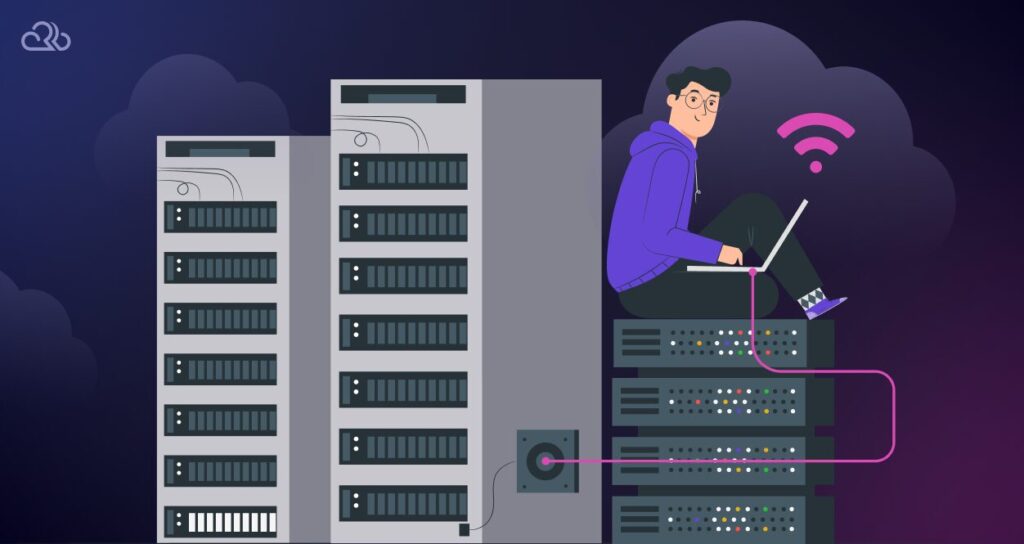
Cost-Efficiency: Web hosting services spread their costs across many customers, making it more affordable than maintaining a dedicated web server.
Technical Support: Web hosts provide technical support, handling server-related issues, which is invaluable for users without technical expertise.
Easy Management: Web hosting companies offer control panels and tools that make website management simpler, even for beginners.
High Security: Professional web hosts implement top-notch security measures, including firewalls, malware scanning, and regular updates, to protect your website.
Smooth Running Assurance: Hosting providers ensure high uptime for your website, using redundant systems and backup power supplies to keep sites running smoothly.
Scalability: Web hosts allow easy scaling of resources (e.g., bandwidth, storage) to accommodate your site’s growth, which can be challenging to manage on a personal server.
Maintenance & Updates: Web hosting services handle the maintenance and updates of the server hardware and software, reducing the workload on the website owner.
What is the definition of a Web Server?

A web server is a system that delivers content or services to end users over the internet. It consists of both physical hardware that stores website data and software that handles requests via protocols like HTTP.
When a user accesses a website, the web server processes the request and sends the relevant content back to the user’s browser. This setup enables the hosting and viewing of web pages, images, videos, and other online content. Common web server software includes Apache and Nginx, each facilitating the dynamic delivery of web content to users worldwide.
Different Types of Web Server
Each of these web servers offers unique advantages, catering to different hosting needs, programming languages, and performance requirements.
Apache HTTP Server
Apache HTTP Server is a widely used open-source web server software, known for its flexibility and compatibility with various operating systems. It supports a range of modules for enhanced functionality.
- Highly customizable through modules.
- Supports various programming languages.
- Wide community support for troubleshooting.
Nginx
Nginx is a high-performance web server that also functions as a reverse proxy and load balancer, known for handling high volumes of concurrent connections with low resource consumption.
- Efficiently manages thousands of simultaneous connections.
- Offers high scalability and performance.
- Functions as a reverse proxy and load balancer.
Microsoft Internet Information Services (IIS)
Microsoft IIS is a scalable web server software provided by Microsoft, integrated with Windows Server. It supports .NET and other Windows-based technologies, offering robust security features.
- Tight integration with Windows infrastructure.
- Supports .NET framework for web applications.
- Offers advanced security features.
LiteSpeed Web Server
LiteSpeed Web Server is a lightweight, high-performance web server, known for its speed and efficiency in serving static content, dynamic content, and accelerating data transfer.
- Optimizes speed for both static and dynamic content.
- Compatible with Apache configurations and .htaccess.
- Offers built-in security features.
Tomcat
Apache Tomcat is an open-source web server and servlet container developed by the Apache Software Foundation. It implements Java Servlet and JavaServer Pages technologies, supporting Java applications.
- Dedicated to Java applications, supporting Servlet and JSP.
- Open-source with strong community support.
- Lightweight and flexible for Java web development.
Things to Check on a Good Web Server
When evaluating a good web server, there are several key aspects to consider that ensure the server meets your needs for convenience, reliability, and performance. Here’s what to look for:
HTTP Protocol Support
A web server must offer robust support for HTTP/HTTPS protocols for secure and efficient data transfer between the server and clients. This foundational feature ensures your web content is accessible and securely delivered to users’ browsers.
Content Delivery

Look for a server capable of delivering a wide range of content types (HTML, images, videos, scripts) efficiently. It should also support dynamic content generation, seamlessly integrating with databases and application servers to serve personalized web pages.
Security Features
A top-notch web server provides strong security measures, including SSL/TLS encryption for secure connections, and configurations to safeguard against web vulnerabilities (SQL injection, XSS). Access control and authentication mechanisms are crucial for protecting sensitive areas of your website.
Customization and Extensibility
The ability to customize server settings via configuration files and extend functionality through modules or plugins is vital. This flexibility allows for tailored server behavior, including custom error pages, URL rewrites, and enhanced performance or security features.
Performance Optimization
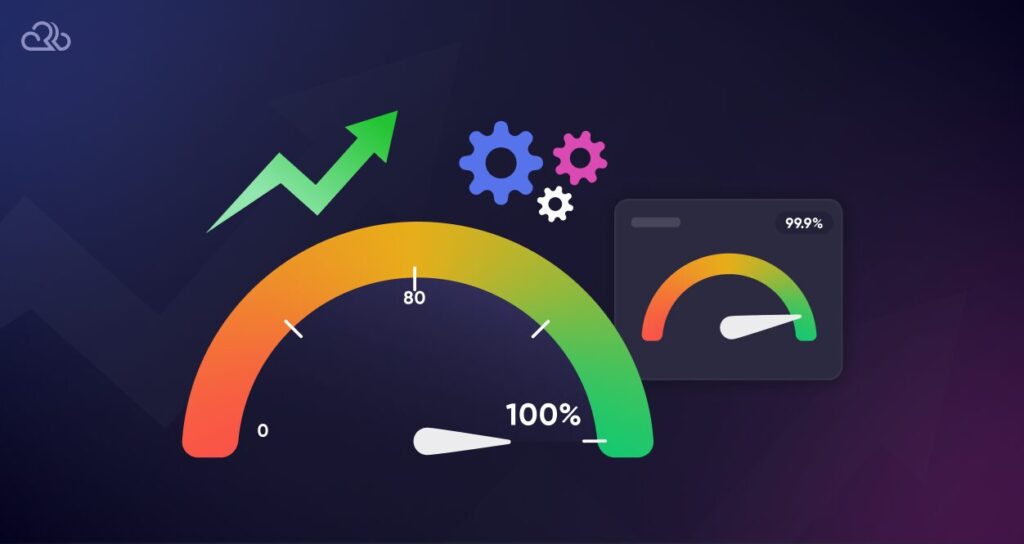
Features that boost server and website performance, such as content caching, compression, and persistent connections, are key. These optimizations reduce load times and bandwidth usage, improving the user experience.
Scalability and Load Balancing
For websites expecting high traffic volumes, the server’s scalability and load-balancing capabilities are essential. They ensure the server infrastructure can distribute load effectively, preventing downtime and maintaining smooth performance during peak times.
Why Choose a Web Server over a Web Host
In computation between web host vs web server, choosing a web server over a web hosting service can offer specific advantages. Particularly for businesses with unique or demanding online needs:
Complete Control: Operating your own web server provides full control over the server environment, allowing for custom configurations and installations tailored to your specific requirements.
Custom Security Measures: You can implement bespoke security protocols, firewalls, and encryption standards to meet your organization’s security policies, offering a higher level of data protection.
Optimized Performance: By managing your own server, you can optimize hardware and software configurations for the best possible performance, ensuring faster load times and a smoother user experience for your website visitors.
Reduced Costs Over Time: For large-scale operations, investing in your own hardware and software might result in lower costs over time compared to recurring hosting fees, especially if you have the in-house expertise to manage the server environment.
Exclusive Resource Use: Unlike shared hosting environments, a dedicated web server ensures that your operations do not compete for resources with other users, leading to consistent performance and reliability.
Which One Is Better for Your Online Business and Why?
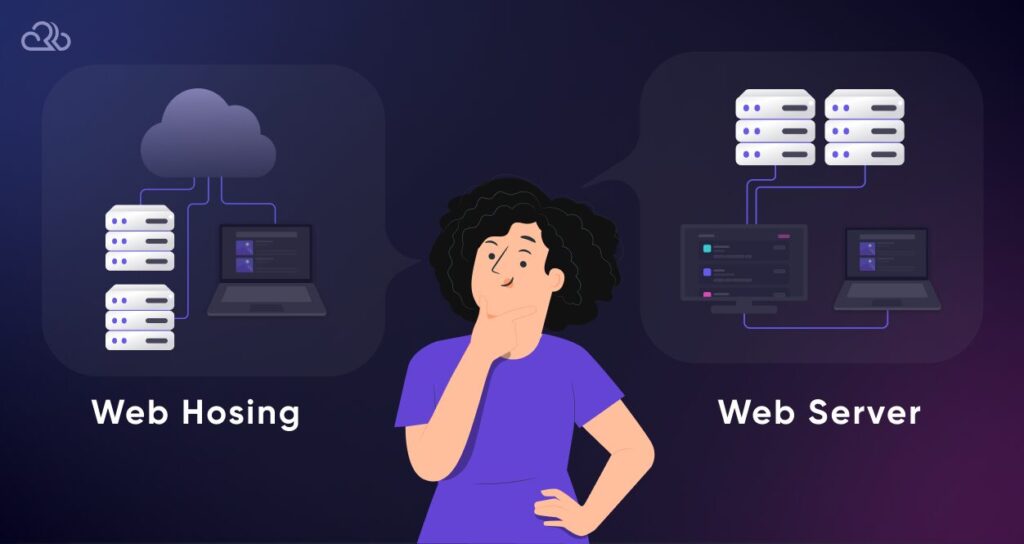
Determining whether a web server (managing your own server) or a web host provided service is better for your online business depends on several factors, including your business’s size, technical expertise, and specific needs. Here’s a breakdown to guide your decision:
Web Hosting Service: Ideal for Small to Medium-sized Businesses
User-friendly Interface: Web hosting services offer user-friendly control panels, making it easy to manage your website without deep technical knowledge.
Cost-Effectiveness: With a web hosting service, you avoid the upfront costs of hardware and software, making it a more affordable option for smaller businesses.
Maintenance and Support: Hosting providers handle server maintenance and offer support, reducing the need for a dedicated IT team.
Web Server: Suited for Large Businesses or Those with Specialized Needs
Customization and Control: Operating your own web server offers unmatched control over your server environment, allowing for custom configurations that meet your specific requirements.
Performance Optimization: You can modify your server’s hardware and software to optimize the performance of your websites and applications.
Security: With your own server, you can implement advanced security measures tailored to your business’s needs, offering a higher level of protection for your data.
If your business lacks the IT expertise to manage a server or if you’re looking to minimize costs while getting your online presence off the ground, a web hosting service is likely the better choice. It offers simplicity, cost savings, and adequate resources for most small to medium-sized businesses.
FAQ
Yes, it’s possible by setting up your own web server, provided you have the necessary hardware, software, and technical expertise. However, this requires significant investment in resources and ongoing maintenance.
The average lifespan of a physical server is about 3-5 years. Beyond this period, the risk of hardware failure increases, and it may become less cost-effective due to advances in technology and energy efficiency.
To select top hosting providers, assess factors like uptime guarantees, customer support quality, scalability options, security measures, and the cost-to-feature ratio. Reading user reviews and testing their customer service can also provide valuable insights.
Yes, web hosting involves a server where your website’s files are stored and accessed. However, the term “web hosting” usually refers to a service provided by a company that manages these servers, offering varying levels of access, maintenance, and support.
Conclusion
Conversely, if your business has unique technical requirements, demands maximum control over its online environment, or experiences high traffic levels, investing in your own web server could be more beneficial. This option is best suited for larger businesses or those with the capability to manage the technical aspects of a server.
Ultimately, the decision hinges on balancing your business’s specific needs, technical capabilities, and budgetary constraints. It’s about choosing the path that aligns with your strategic objectives and offers the best platform for growth and success in the digital space.








